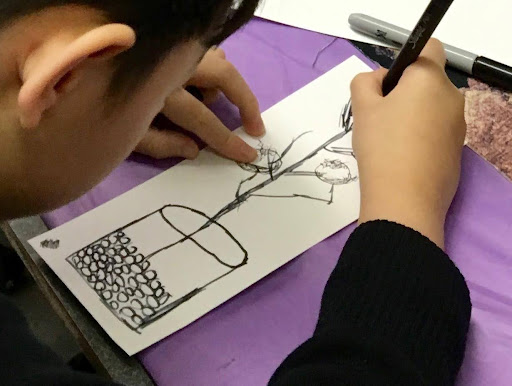What is focus anyway?
After Googling for a definition, the following elements of FOCUS really stand out for me:
- a center of activity, attraction, or attention
- a point of concentration
As an arts-informed educator, I like to think about concepts through materials, artwork, and creation-making. If we think about focus as a center within a defined space, like a focal point, a centrepiece, or a point of direction, for instance, the abstract quality of focus as a concept appears tangible, even somewhat pliable!
Children’s focus, and its apparent decline, is a hot topic for educators. As a teacher mentor, and a parent of a very busy son, focus is something my husband hears me talk about a lot!
How many times a day do you remind your children to focus, or ask for quiet so you can focus?
If you’re anything like me, I crave focus time, so I request this a lot. Focus feels blissful.
So, how might we intentionally design for focus within our inquiries?
I had the privilege of witnessing blissful focus during a Pop-Up Studio session with a Grade Two and Three class. During our Debriefing Time, I invited the children to share their reflections through the following prompts:
What, if anything, did you enjoy in your Studio Time?
What, if anything, would you like to return to if we had more time?
Many hands shot up, but one response took the classroom teachers by surprise.
One “shy” child speaks up.
Identified as a “shy” child, Joy declared the following in a strong, confident voice:
“I loved my concentrating. I want more time to focus on my concentrating. And I want more time to make more details in my drawings… and in all of the makings. Even though my drawing is already detailed, I want to make it even better!”
I just love this quote. It feels blissful and compelling. Joy doesn’t often share her insights publically, so it was especially poignant for her teachers.
What happened next?
The teachers shared that Joy’s reflection continues to serve as call-to-action: to protect time and space to linger, to focus on the smaller details, and to feel expansive in creative bliss.
Joy is asking for protected time to stay in the moment doing something she likes. Savouring, lingering, and generally slowing down isn’t always easy for those of us in mandated curriculum settings where content feels overwhelming and deadlines are always looming.
How can we protect time to focus?
It might be simpler than you think. If you are an early years teacher, or a teacher that has seen “centers time”, you might take inspiration from the calm independence children get from choosing an open-ended, playful experience in a judgment-free zone.
If you’re interested in learning more about how teachers can foster judgment-free zones AND still get meaningful feedback to feedforward? Email me and ask me about my coaching framework, POWR.
